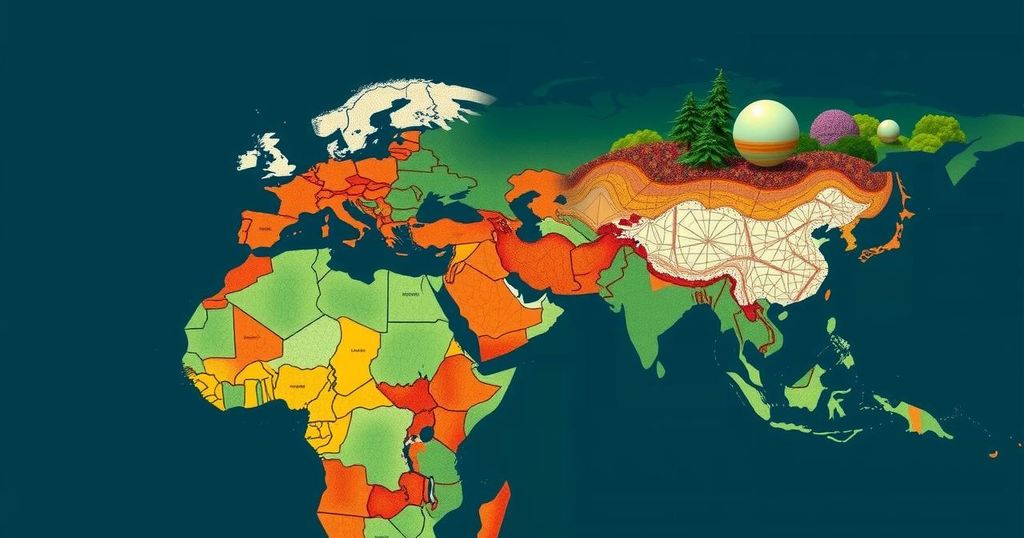Richer Nations Begin Compensation for Climate Change Damages in Poorer Countries
Richer countries are beginning to compensate poorer nations for climate-related damages, highlighted by Cyclone Freddy’s impact on Malawi. Christopher Bingala’s story illustrates the plight of subsistence farmers who receive financial relief, part of a growing mechanism for loss and damage funding established by wealthier nations. While $720 million has been pledged, experts warn that this may not be sufficient to meet escalating needs, as discussions continue at the COP29 climate summit regarding effective fund allocation and utilization.
In the wake of Cyclone Freddy, which devastated Southern Malawi, the plight of many subsistence farmers has become increasingly dire. One such farmer, Christopher Bingala, lost his home and livestock amid the cyclone’s flooding but received a crucial payment of approximately $750 for climate-related damages. This payment exemplifies the emerging concept of “loss and damage” compensation aimed at aiding countries disproportionately affected by climate change, despite their minimal contributions to global emissions.
The concept was championed in 2022 when wealthier nations agreed to establish a fund for addressing the damage caused by climate change, culminating in pledges amounting to around $720 million from countries including the European Union, the United States, and the United Arab Emirates. However, as climate-related disasters escalate in severity, experts express concerns that these financial commitments will fall short of the actual needs.
At the ongoing COP29 climate summit in Baku, Azerbaijan, ongoing discussions center around how to equitably distribute these funds to developing nations, part of a broader climate finance strategy that encompasses loans and investments. Prime Minister Philip Davis of the Bahamas underscored the urgency, stating, “We just hope that the global north and the nations whose economy is fueled by the emissions take up their responsibility to look at what they are causing us.”
The aftermath of Cyclone Freddy saw over 650,000 individuals displaced in Malawi alone, resulting in severe food shortages and challenges in recovery. Bingala, receiving financial support from the Scottish government via the nonprofit GiveDirectly, managed to relocate and rebuild a safer home. This pilot program illustrates the potential for a more extensive system that addresses loss and damage while highlighting the limited protections available to low-income families in developing countries.
Malawi’s initiative is indicative of a broader need, as developing countries grapple with severe weather events exacerbated by climate change. Prime Minister Davis also pointed out that the costs associated with disaster recovery have substantial implications on national debts, stressing that “forty percent of my national debt could be directly attributed to the consequences of climate change.”
Despite the pledges, actual funding has yet to materialize effectively. Countries are engaged in finalizing the functioning of this fund, which is anticipated to be managed by the World Bank. Moreover, discussions continue around the scope of eligible expenditures, with some advocating for use beyond mere disaster recovery, including relocating communities threatened by rising sea levels.
As climate-related disasters intensify, the projected need for loss and damage financing may soar to $250 billion annually by the year 2030. Davis emphasized the interconnectivity of humanitarianism and stability, cautioning, “If they do nothing, they will be the worst for it. When my islands are swallowed up by the sea, then what do my people do?”
As global warming intensifies, developing countries, particularly those with limited resources, are facing escalating climate-related disasters such as hurricanes, droughts, and floods. These nations contribute minimally to global greenhouse gas emissions yet disproportionately bear the consequences. In response to increasing damages from climate crises, a consensus emerged during international climate discussions, leading to the establishment of funding mechanisms for “loss and damage” compensation aimed at supporting vulnerable countries. Recent discussions at the COP29 climate summit have underscored the urgency of effectively deploying these funds to ensure resilience against future environmental challenges.
The introduction of loss and damage compensation is a pivotal step towards recognizing and addressing the disparity in vulnerability to climate change. Though initial pledges have been made by wealthier nations, the urgency of actualizing these funds is paramount as developing countries like Malawi face unprecedented challenges. Continued international collaboration and responsible stewardship of these funds are crucial to support recovery and build resilience against future climate-related disasters.
Original Source: www.delawarepublic.org




Post Comment